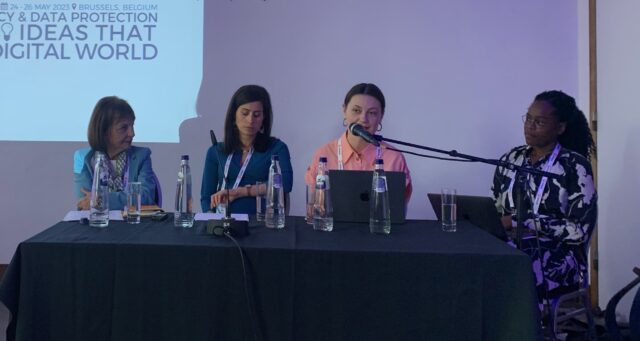AI Policy & Governance, European Policy, Free Expression, Government Surveillance, Privacy & Data
EU Tech Policy Brief: June 2023
Also authored by CDT Europe’s Vânia Reis and Rachele Ceraulo
This is the June 2023 issue of the Centre for Democracy & Technology Europe‘s monthly Tech Policy Brief. It highlights some of the most pressing technology and internet policy issues under debate in Europe, the U.S., and internationally, and gives CDT’s perspective on them. Our aim is to help shape policies that advance our rights in a digital world. Please do not hesitate to contact our team in Brussels: Iverna McGowan, Asha Allen, and Ophélie Stockhem.
Public Interest Technologists Urge EU Lawmakers to U-Turn Their Approach to Fighting Online CSA
On 10 May, a group of over 30 leading academics and public interest technologists from across Europe wrote an open letter – published by Politico, and coordinated by CDT Europe – urging European Parliament members and Representatives of the EU Member States to listen to their expertise on encryption and artificial intelligence, and consider a complete overhaul of the draft EU law on child sexual abuse online.
The experts expressed deep concern about the proposal, in particular the risks it poses to the privacy and security of communications and its impacts on children’s rights and democracy more broadly. They highlighted the technical infeasibility of proposed technologies, which are at odds with computer science, and that the bulk and pervasive monitoring the proposal would introduce would result in imprecise scanning and errors that could have life-altering consequences for those involved. The experts confirmed that all proposed approaches for content moderation in end-to-end encrypted communications – including traditional ‘backdoors’, client-side scanning, or homomorphic encryption – would equally amount to breaking end-to-end encryption and cancelling out the privacy protections of the technology.
The group of experts called on EU lawmakers to rely on scientific and evidence-based approaches when discussing such sensitive subject matters, and ensure that no proposed EU legislation ever obliges online service providers to break end-to-end encryption or engage in general monitoring of communications.
Tackling Online Gender-Based Violence (GBV) & Gendered Disinformation: CDT Europe Discusses with CSIS and France 24
The EU’s Digital Services Act (DSA) requires that very large online platforms and search engines conduct risk assessments — which must identify and assess systemic risks to fundamental rights, and how specific risks including online GBV can be mitigated — and those evaluations have now begun. So too have debates on the draft EU Directive to combat violence against women, and CDT Europe’s, Advocacy Director for Europe, Online Expression & Civic Space, Asha Allen, joined a panel discussion organised by the Centre for Strategic and International Studies and aired on France 24’s The 51% Show to further discuss developments in the EU on the issue of online GBV.
The aim of the CSIS event was to discuss how different stakeholders should best address the spread of online gender-based disinformation and harassment. Joined by experts Alejandra Caraballo, Moira Whelan, and Kristina Wilfore, Allen discussed recent actions by European lawmakers to address gendered disinformation, and the role civil society has played in advancing improvements to draft legislative proposals. Allen explained that the criminalisation of certain forms of online gender-based violence may result in disproportionate and discriminatory enforcement, particularly against marginalised groups, resulting in a negative impact on equal participation in democracy globally. Panellists discussed the importance of a multi-layered approach to online GBV that combines appropriate criminal standards with improved due diligence obligations for online platforms.
France 24’s The 51%, a program dedicated to raising awareness about women reshaping our world and the issues that impact them, also hosted a conversation about taking a multi-layered approach to online GBV. Discussing the potential of the DSA in effectively addressing online harassment, Allen highlighted the specific importance of the risk assessments, which are due to be completed at the end of August.
CDT Europe at the 2023 Beyond Growth Conference
On 16 May, Asha Allen, CDT Europe Advocacy Director for Online Expression and Civic Space, spoke at a panel at the Beyond Growth Conference where participants discussed ways for the European Union to balance economic growth of the digital sector with the creation of safe online spaces.
Allen reflected on the role of the online space and how it acts as a forum for mobilisation and freedom of expression. She also recognised that our current digital ecosystem can reinforce societal harms and historic discrimination, for instance by limiting free expression and suppressing minority voters through unethical ad targeting. Allen stressed that addressing inextricably linked societal and digital issues fundamentally requires the imagining of a new societal model, one that does away with the false argument that innovation and economic growth are inherently incompatible with human rights.
Allen recommended building this new model on current efforts to make human rights due diligence a regular part of tech industry workflows. She urged regulators to establish frameworks that effectively hold both industry and lawmakers accountable for their actions – or lack thereof – in addressing structural societal harms. Finally, she recommended creating a civil society advisory board, a structured platform for public interest organisations to provide expertise and exercise regulatory oversight.
CDT Europe Director Addresses a Seminar on EU Digital Diplomacy and Human Rights

On 4 May, CDT Europe Director Iverna McGowan addressed a seminar on “Digital Diplomacy and Human Rights” — hosted by the Permanent Representation of Austria — for a discussion on how the EU’s Digital Diplomacy can ensure that human rights are respected in emerging digital technologies.
McGowan stressed that aligning EU regulations with international human rights standards will be key to ensuring foreign policy on digital human rights. She further noted that, while discussions on different types of digital technology are important, it’s even more crucial to consider the consistency with which we support rule of law safeguards, citing as an example the role of human rights law in determining the lawfulness of surveillance measures, irrespective of the technology concerned. McGowan concluded by stressing the need to engage with civil society actors, who hold key expertise in digital human rights and foreign policy, and recommended that the EU’s diplomatic service tap into the already existing broad civil society networks and global coalitions.
CDT Europe at CPDP 2023 in Brussels

The annual Computers, Privacy & Data Protection Conference, which brings together academics, lawyers, practitioners, policymakers, industry, and civil society from all over the world to discuss emerging tech policy issues and trends, took place in Brussels between May 24-26. CDT Europe, a moral supporter of the conference, showed up in force, attending several notable events and participating as expert panellists across the event.
On 24 May, our Asha Allen participated in a workshop organised by civil society partners the European Partnership for Democracy, where institutional and civil society experts discussed developments on the draft EU Regulation on Political Advertising. Allen highlighted the importance of narrowing the draft proposal’s definition of political advertising to cover only commercial (paid/sponsored) political content, as the Regulation in its current form would pose a significant risk to free expression and democratic participation. She also cautioned lawmakers against using the Regulation as an attempt to legitimise the misuse of sensitive data for political gain and as a vehicle to create new parameters around regulating political speech.
On 26 May, our Iverna McGowan spoke at a panel focusing on the EU AI Act’s role in addressing social justice in the employment sector. McGowan noted that, while the EU AI Act will bring more transparency and accountability to the use of employment decision-making technologies, open questions remain around the lack of avenues to redress, which would ensure that individuals subject to these technologies’ decisions have access to judicial review in case of discrimination. Reflecting on the risks and harms these technologies pose to workers’ health and safety, particularly for people with disabilities, McGowan recommended that EU policymakers ensure meaningful access to judicial remedy for workers, and use the Civil Rights Standards for 21st Century Employment Selection Procedure as a guide to ensure that tools used to make employment decisions are fair and equitable.
Don’t forget to check out CDT’s publications for this month, and to sign up to CDT Europe’s AI newsletter!


